Working to creating exits and improving operational performance of existing portfolio companies is on the top of the agenda for private equity investors for this year, according to a VCCircle survey of the most active PE investors in India. The fund managers have also come to recognise that their troubles are self-inflicted rather than due to external factors like regulatory environment and macroeconomics, reveals the survey.
The survey collected responses from 28 general partners or GPs capturing representations from a wide cross-section of the industry. The respondents included large funds managing upwards of billions of dollars, to mid-market PE firms to funds that do PIPE deals (private investment in public enterprises).
The respondents reflected on 2013 as a year of double whammies with exits getting tougher due to the virtual shut down of the primary capital market and the sharp depreciation of Indian currency which makes churning respectable returns that much tougher for offshore funds. This, at a time when India story has taken a major hit with the country facing macroeconomic headwinds like slowing economic growth, persistent high inflation and intertwined tight monetary policy cringing investments besides reforms stalemate ahead of general elections.
Given that the country is due for a new government at the centre in a few months, which would set the tone of policies which in turn would be crucial for PE funds of recent vintage, 2014 is going to be an important year for GPs. The fund managers are also expected to get down to initiate actions which would help them prepare a better report card for their LPs for the future.
Here’s a snapshot of what India’s most active PE fund managers think about 2014:
Where are the exits?
This is the biggest question facing the Indian private equity industry. According to VCCEdge, the data research platform of VCCircle, India has attracted $104.5 billion in private equity/venture capital investment since the start of century and has returned only $27.5 billion through exits. With a volatile capital market, 2013 saw 158 exit deals worth $3.77 billion, representing a dip of 8 per cent in terms of exit volume and 22 per cent in exit value compared to the 172 exit deals worth $4.85 billion seen in 2012.
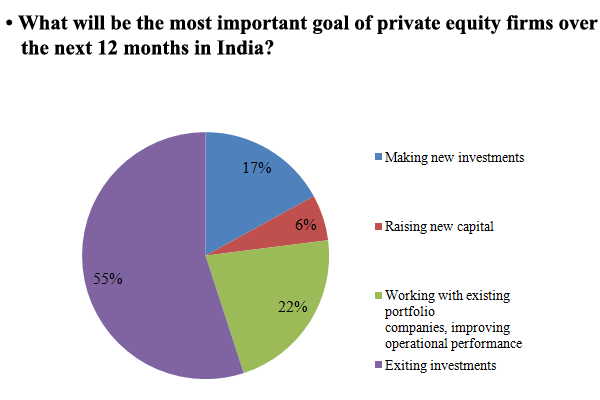
Over three quarters of the GPs surveyed by VCCircle said that working either on exits and operational improvements in companies will be the top priority, signalling a switch to portfolio management from capital raising/deployment for the industry.
Around 55 per cent of GPs said that exiting investments will be their most important goal, while 22 per cent said it will be to work with existing portfolio companies on improving operational performance. Of the rest, 17 per cent said making new investments will monopolise their time followed by 6 per cent saying they will be raising new funds.
On the flip side, GPs are cautiously optimistic on how the exit activity will pan out in 2014. While 17 per cent said that exits will significantly increase this year, four of five fund managers said there will only be a marginal increase.
Several private equity firms like New Silk Route and 3i Group have hired senior industry executives like Rajeev Gupta and Arun Nanda, respectively, to advise on exits. Other private equity firms have also been adding operating executives on their teams.
GPs are now adapting to the market reality that capital markets are likely to remain shut from an IPO led liquidity perspective. "Now the discussions around exits are quite different, with focus on creating and delivering value. A lot of lessons have been learned and we are very optimistic on the future," said a fund manager.
Around 83 per cent of the GPs surveyed said that secondary sale to another PE firm would be the most relevant route of exit, followed by 17 per cent indicating it will be sale to strategic investors, which is tied to M&A appetite.
Fundraising static
Sentiment on fundraising is increasingly neutral among Indian GPs as they wait for general election results due later this year.
A little over half of all GPs surveyed voted for a marginal change in LPs’ appetite for investing in India with 28 per cent each saying they anticipate a marginal decrease or a marginal decrease in allocations of LPs towards Indian private equity in 2014. Another 28 per cent feel it’s going to remain at the same level as last year.
At the same time, 11 per cent said there would be a significant increase against 5 per cent who said there would be a significant decrease, slightly tilting the overall vote towards a favourable outcome in 2014.
One GP said that "post elections, uncertainty would reduce on fundraising" while another one said that things would improve only if GDP growth rate goes above 6.5 per cent. India’s GDP growth is estimated to have decelerated to 4.5 per cent for the year ended March 31, 2013, its slowest pace in years.
Meanwhile, only 22 per cent of the GPs surveyed said they would raise a new fund during 2014, while 78 per cent said there were no such plans.
Year 2013 saw the least amount of fresh commitments in any year in the history of private equity in India. There were 33 private equity funds that closed in on $2.84 billion worth of new commitments during the year against the $3.1 billion of commitments mopped up by 51 funds in the previous year, according to VCCEdge. However, some asset classes are seeing a revival with real estate focused funds in particular seeing appetite, especially from domestic investors.
Mea culpa
The biggest issue faced while fundraising by Indian GPs is generally low returns. Closer to half of the fund managers attribute it to low returns from Indian investments followed by 22 per cent of the respondents, each, blaming it on corporate governance in portfolio companies and macroeconomic factors. Depreciating rupee was listed by 6 per cent while regulatory environment by just 3 per cent of the fund managers as a pain point.
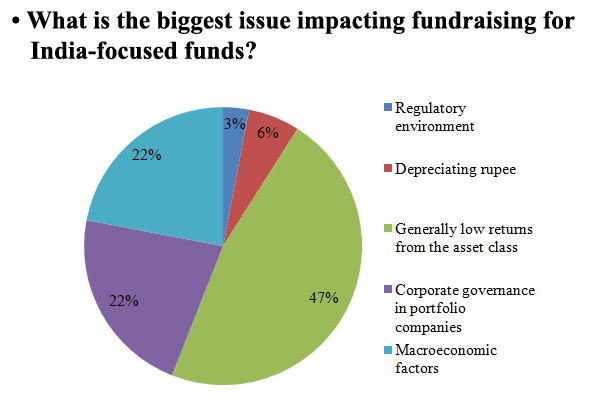
This indicates that while macro-economic issues may have added to industry's woes, there is an acknowledgement that the problems were largely of the GPs own making.
Around two-thirds of the GPs surveyed said that they are seeing an increasing interest in co-investments from their LPs, an investment model which provides closer scrutiny by the LPs as some of their money is invested directly in a portfolio firm.
One GP said that LPs are likely to wait for macroeconomic conditions to improve and a stable government at the centre before making any serious direct investments.
Valuations to decline but competition to increase
GPs expect to close more deals in 2014 compared with 2013 as "valuations for good companies are likely to be reasonable," according to one fund manager. "All the bad news is in and we are likely to see the beginnings of an upturn," said another GP.
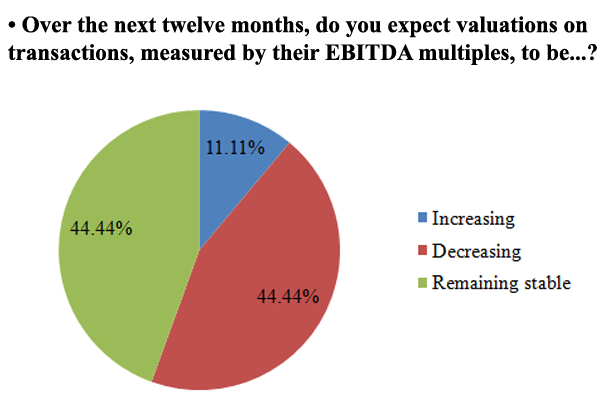
As much as 39 per cent of those surveyed, expect a higher deal flow in 2014 and 61 per cent said they will continue 2013 pace. None of the GPs surveyed expect to slow down investments this year. This is good news for firms looking to raise capital.
The reason for this could be falling valuations, as close to half of the GPs surveyed expect it to fall in 2014 while only 12 per cent of the respondents expect valuations to rise. The rest felt it would remain stable.
The top most factor driving valuation will be asset specific, with around a quarter saying it will be buyer interest for target. This would be followed by external factors like macroeconomic conditions and public market valuations at 21 per cent each. Other factors impacting valuation for PE deals are seller distress (15 per cent), change in policies (9 per cent), performance/market position of the target (9 per cent) besides the dry powder or unused PE money in the market (3 per cent).
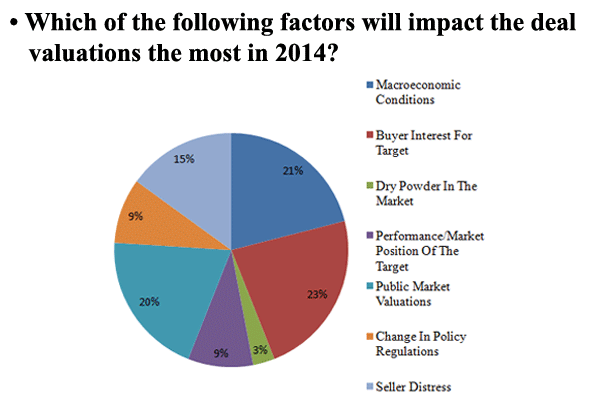
But falling valuations are attracting more investors to queue up for investments. Close to half of the GPs surveyed said that competition for attractive investment opportunities will increase this year against a little over a quarter who feel it will come down. The rest expect it to remain at the same level as 2013.
Even as the dry powder with Indian GPs fell in 2013, the number of deals increased both in value and volume terms as global private equity majors poured capital in the country. Private equity investments increased 11 per cent in terms of deal value from $9.49 billion in 2012 to $10.5 billion in 2013. Deal volumes on the other hand decreased 12 per cent to 660 deals last year, according to VCCEdge.
What is the best strategy to play India?
Even as the Indian market consolidates, GPs are also becoming increasingly specialised and focusing on certain strategies rather than trying to be an all-rounder. While growth capital continues to remain the mainstay, it is followed closely by buyouts and secondary transactions.
Among the segments expected to be most attractive, growth capital leads the pack with 22 per cent of the votes. Buyouts are also increasingly becoming attractive at 19 per cent, with GPs looking to exercise control and the stigma for entrepreneurs around selling out, subsiding.
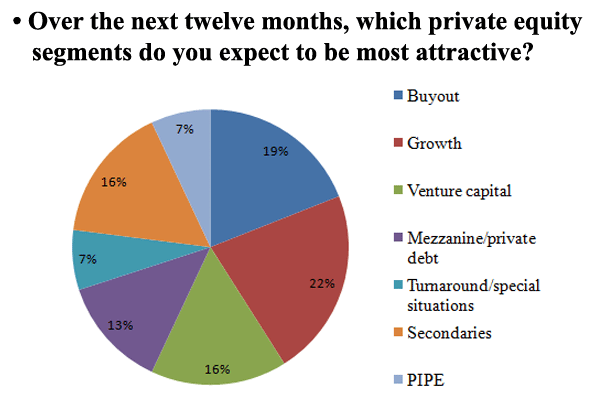
Secondaries and venture capital bets are also attractive with 16 per cent of the votes each, followed by mezzanine/private debt (13 per cent), turnaround/special situations (7 per cent) and PIPE (7 per cent).
The RBI is in the process of allowing leveraged buyouts of stressed assets in the country, which may open up more buyout opportunities going forward. Although there is no explicit ban on leveraged buyouts, banks do not lend to support such deals which has implicitly kept that side of the market virtually shut in India.
Patients are the new kings but also pricey
The domestic consumption story still remains a hot investment theme among private equity investors but healthcare, including services and pharmaceuticals, now joins it as the most likely investment bet for the country’s top GPs.
While 26 per cent of investors indicated that firms in the consumer sector will be focus area this year, an equal proportion said healthcare will be an attractive space to invest. Within healthcare, healthcare services looks juicy to around 15 per cent of the respondents and 11 per cent felt they are eyeing the pharmaceutical space.
Next on the list is financial services with 18 per cent of the votes followed by IT where 15 per cent of the respondents say they are looking to invest. Manufacturing (9 per cent) and infrastructure (6 per cent) are also among the sectors which are likely to see PE activity.
Healthcare and consumer are also believed to be most overvalued. Over half of the fund managers surveyed said that healthcare sector is most overvalued led by firms in healthcare services (33 per cent of the votes) and pharmaceuticals (22 per cent).
Around 27 per cent of the respondents said consumer is the most overvalued and the rest pegged financial services, IT and media & telecom segments as those where asking valuation is more than what they deserve.
(Edited by Joby Puthuparampil Johnson)






